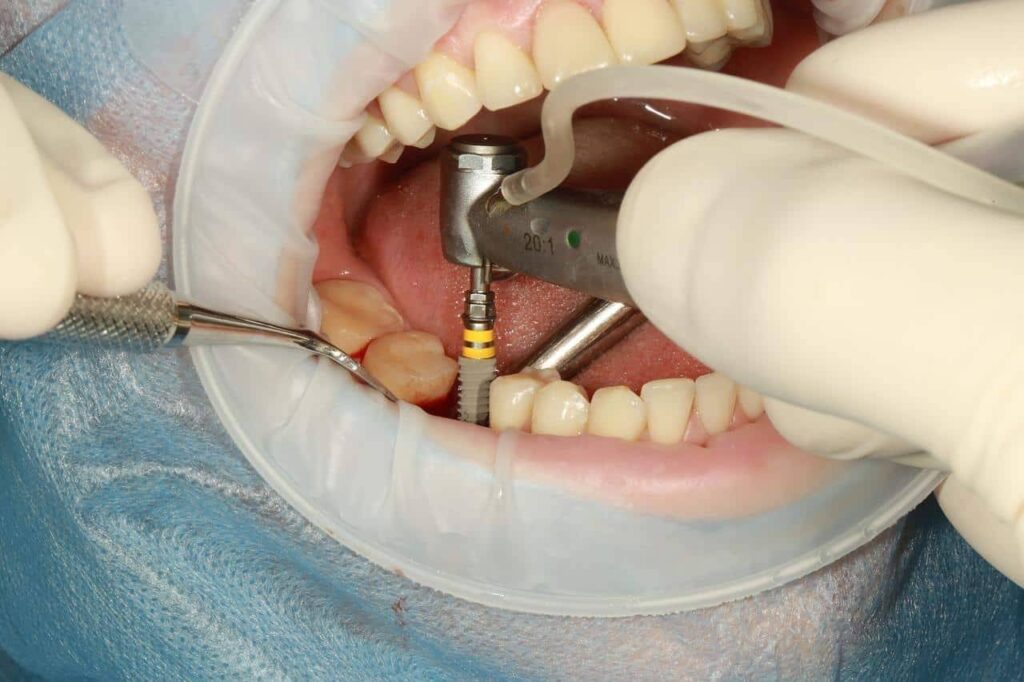
What Causes Bad Dental Implants?
If you are looking for a permanent tooth replacement to avoid the inconvenience of having to look after dentures slipping while you bite or chew or placing glue to keep them in place, dental implant surgery is a viable option for you. Although there are higher success rates and exponentially higher patient satisfaction rates compared to full or partial dentures for dental implant procedures, there will always be a risk of dental implant failure. To understand the mechanism of dental implant failure, you must first understand what is a dental implant and how dental implants are implemented.
Introduction: Dental Implant Procedures
A dental implant procedure is a process involving multiple visits to Dr. Harman. Once your he thoroughly examines your individual situation, he will consider many factors to ensure that your dental implants have no issues. The procedure will involve having Dr. Adams install the dental implant into your jawbone at Dr. Harman’s office and letting your bone along with any bone grafting material grow into the implant and “become you” for a few months. An abutment (piece that screws into the implant) is fabricated together with a crown which is put in place and secured by dental screws.
Note that the stability and durability of dental implants rely on good oral health and having strong and healthy bone where the implants are. The risk of dental implant failure lies in either undermining the bone due to pressure or disease. Moreover, bad oral hygiene will expose dental implants to the same problem that caused tooth loss in the first place, such as tooth decay and gum disease, or problems specific to dental implants, such as peri-implant diseases. Dr. Harman will thoroughly discuss how to clean your implant or implants.
Signs of Dental Implant Failure
If you are experiencing the following symptoms, you may need to visit Dr. Harman immediately to check for dental implant failure:
- Gum Inflammation or Gum Disease around the plant area.
- Dental Implant Feeling Loose: This could be caused by the crown not being adequately affixed to the implant.
- Difficulty Chewing: This might be caused by the dental implant not being in the proper position. Nerve damage may also be an underlying cause.
- Swelling: You may expect swelling right after dental implant surgery that may last up to three days. However, dental implant failure might be present if the swelling lasts longer because this is one of the primary dental implant infection signs.
- Pain or Discomfort, especially a week after dental implant surgery
What Are The Most Common Causes of Dental Impact Failure?
Although very uncommon, dental implants may fail, just as any dental restoration. The most common reason for implant failure is smoking or vaping right after surgery. The second most common reason is a patient that has an autoimmune disease. Along with Dr. Harman, Dr. Adams will diagnose and educate every patient individually to decrease the risk of failure to the maximum. Another big contributor to implant failure is an inexperienced surgeon. That is why Dr. Harman sought out and asked Dr. Adams to join his team. You can see Dr. Adams’ bio on the “meet the team” page. Dr. Adams is so advanced in implantology, he even teaches implantology to dentists.
How to Prevent Dental Implant Problems?
To prevent dental implant failure, you must follow Dr. Adams instructions strictly after the dental implant process. It would be best if you continuously practiced good oral hygiene:
- making regular dental appointments for check-ups and cleaning,
- brushing properly at least twice a day,
- flossing once a day,
- and not smoking or drinking alcohol and eat soft foods, especially within three to four months of the dental implant procedure.
Takeaways: For Trouble-free Dental Implants, Having a Dependable Dentist Goes a Long Way
Considering how much dental implants cost is in terms of time and resources, it pays to ensure that you find a dentist that will ensure that you won’t have a problem with your dental implants. Deciding on dental implants shouldn’t be taken lightly, and it pays to have the best dental advice constantly to prevent bad dental implants. Dr. Adams is a long-time practitioner in dental implant surgery. Dr. Harman is also a dependable dental professional with 4 dental implants in his mouth. If you are looking for the best dental care, dental surgery, cosmetic dentistry, and specialized dental treatments for your entire family. To know more about the latest dental implant procedures and other dental concerns in Phoenix, call us at (602) 840-5300.
Comments are closed.
Share This Story, Choose Your Platform!
